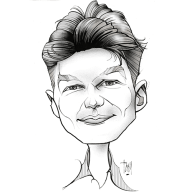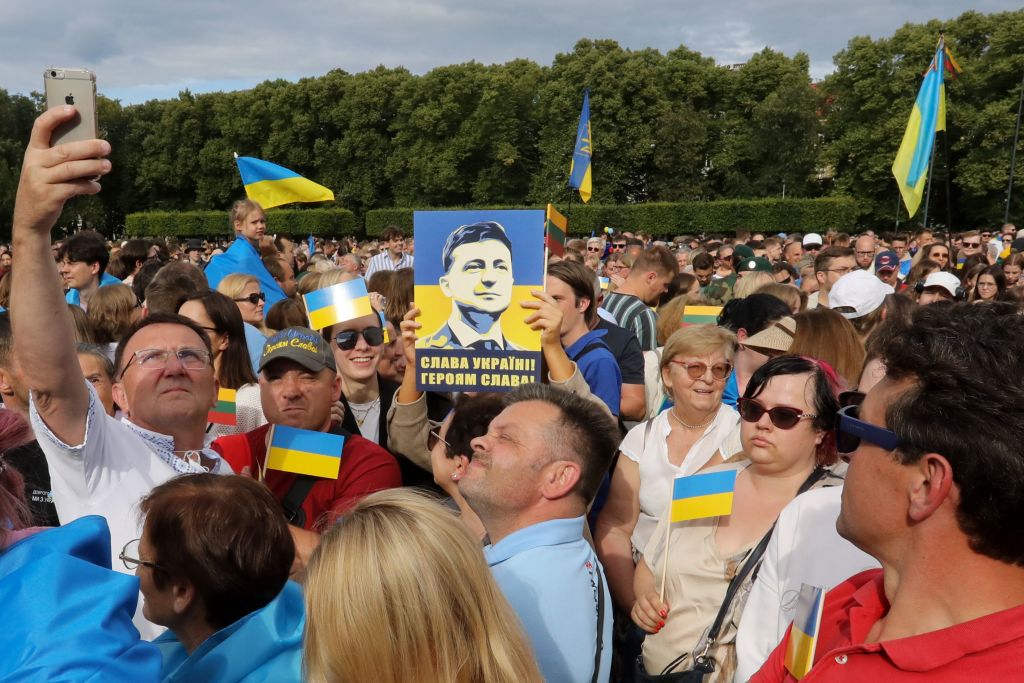Vilnius, Lithuania
This week, the world’s eyes were on the Lithuanian capital Vilnius as it welcomed global leaders for Nato’s 74th summit. The event was a logistical challenge not helped by the fact that Vilnius is only 30km away from the border with Belarus, which is now home to Russian nuclear weapons.
Commercial flights were suspended for the duration of the summit. Air defence systems were stationed. Four-thousand troops, undercover police officers and bomb detection dogs roamed the streets. A Boeing E-3 Sentry – Nato’s eyes in the sky – circled the capital while a 30km radius no-fly zone was imposed.
Shuttles to and from the exhibition centre had paint jobs which read, ‘while you are waiting for this bus, Ukraine is waiting for F-16s’
But the most prominent sight in the capital was the sheer level of support for Ukraine. The summit may have ended this week without Nato membership being offered to Kyiv, but that did not stop the summit hosts from signalling to Ukraine that they are among its staunchest allies.
The horizontal bands of Ukraine’s blue and yellow outnumbered Lithuania’s tricolour throughout the city, with Ukrainian flags on rooftops, shopfronts, buses, balconies, recycling bins and even the motorway lamp posts that stretched beyond the capital. The Vilnius administration handed out some 20,000 Ukrainian flags for residents the day before the summit.
When journalists attending the event collected their passes, they received ‘Glory to Ukraine!’ chocolates and Ukrainian borscht-flavoured crisps. Adverts at the event listed the ways in which Lithuania has supported Ukraine throughout the conflict. This was just as much about lauding Vilnius as shaming other countries which have dragged their feet over military support. Sometimes the pro-Ukraine messaging was even more direct. Shuttles to and from the exhibition centre had paint jobs which read, ‘while you are waiting for this bus, Ukraine is waiting for F-16s’. And in the evenings, billboards across the city flashed with the message, ‘UKRAINE DESERVES NATO MEMBERSHIP NOW’.
This decision to abandon any pretence of neutrality – despite the Nato convention that host countries should remain unbiased – was an easy one to make, a senior Lithuanian envoy says. Vilnius recognised that Ukraine wasn’t going to get an official invitation to join Nato while still fighting Russia, but it still wanted to push hard for an official post-war pathway to membership. On the day before the summit kicked off, Lithuanian President Gitanas Nausėda said he expected ‘a summit of decisions – not just declarations’.
The Lithuanian government’s support for Ukraine largely reflects the public mood here. During the summit it wasn’t unusual to see locals wearing the Ukrainian colours, or signs in restaurants saying Putin supporters wouldn’t be allowed to enter. There were chants of ‘Slava Ukraini’ when Zelensky arrived at the Presidential Palace for the Nato leaders’ dinner. Many of the Lithuanians wearing the Ukrainian colours have no hereditary connection to the country – but they are bound to Ukraine by their shared history. One 54-year-old woman told me about the abuse she suffered aged 19 just metres from where we stood. In the 1980s she was in Vilnius supporting hunger strikers who wanted to secure the release of political prisoners. Soviet militiamen unexpectedly arrived and beat her and 60 others with batons before arresting her. It’s only been 32 years since Lithuania’s independence was restored. Many here still have brutal memories of Russian suppression. There’s real empathy for Ukraine’s struggle.
As the week progressed, realism trumped idealism. While a Nato-Ukraine council was established by the alliance, the Lithuanian hope that a future ‘Vilnius roadmap’– a robust timeline for Ukraine’s membership – would emerge from the summit was flattened. Instead the alliance released an ambiguous communiqué which stated that Ukraine would be able to join Nato ‘when Allies agree and conditions are met’.
Nonetheless, Lithuania’s efforts didn’t go unrecognised. As a bullet-marked Ukrainian flag – which travelled from the frontline near Bakhmut to Vilnius – was raised in Lukiškės Square on Tuesday, Zelensky thanked a crowd of 2,000 people for Lithuania’s ‘very clear and very honest and very courageous position’.
Despite Nato leaders failing to agree on a formal route for Ukraine’s accession, the historic summit solidified Lithuania as an unwavering – and tireless – ally to Kyiv.







Comments